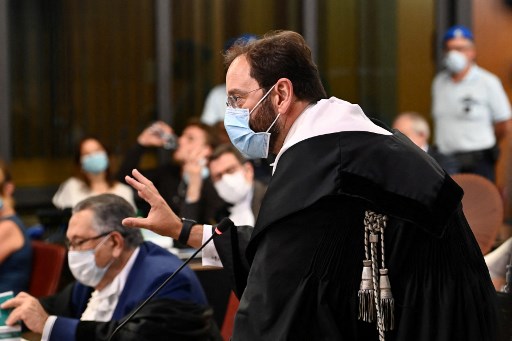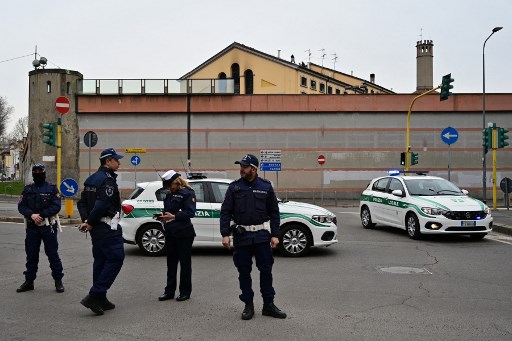What happens when a foreign national gets arrested in Italy?

It’s a situation nobody ever wants to be in, but what if you’re arrested in Italy? Here's an overview of your rights and what you should do if this happens to you.
Most people come to Italy to enjoy the weather, food, and relaxed lifestyle. Very few come to break the law, but there's always a chance you could find yourself in trouble with the Italian police whether through misunderstanding or misdemeanour.
Pray it never happens but if you are arrested while in Italy, what are your rights? What happens next, and who can help you?
READ ALSO: Who to call and what to say in an emergency in Italy
Whether it’s a road traffic violation, a minor offence or a more serious charge, here's what you need to know about Italian legal processes upon arrest.
The Italian system
Italian legal procedures may slightly differ from those in your home country, but just like in most Western countries, the Italian judiciary is independent from the government and all foreign nationals have the same rights (and face the same laws) as citizens.
Rights upon arrest
Upon your arrest, you will be orally informed of your rights, which, in short, are the following:
You have the right to appoint a lawyer of your choice. If for any reason you cannot find a lawyer, the police will ask the local bar association to produce a state-appointed lawyer (difensore di ufficio). In Italy it is mandatory to have a lawyer when facing criminal charges.
You also have the right to inform your family and your consulate of your arrest.
Keep in mind that, in case you’re caught and arrested in the act of committing a crime (un reato) or immediately after committing a crime, you do not have the right to know the allegations held against you until the udienza di convalida, a judicial hearing for the validation of your arrest (this must take place within four days of the arrest).
In all other circumstances, you will be served an arrest warrant (mandato), which must include an overview of the allegations.
Legal representation
You are entitled to representation by a lawyer (avvocato) during all stages of the criminal proceedings against you.
You can find contact details for Italian lawyers through the Albo Nazionale Avvocati (National Lawyers Register). Alternatively, you may also reach out to your consulate and ask to be given the contact information of lawyers suited to your case.
As previously mentioned, if you can’t find a lawyer, a defense counsel will automatically be appointed by the police or by the court from a list of lawyers provided by the local bar association.
READ ALSO: Guardia di Finanza to Carabinieri – who does what in the Italian police force?
Please note that, if you are not under arrest but merely under investigation, you cannot be interviewed by the police in the absence of your lawyer. Any evidence gathered during an unlawful interview will be stricken as inadmissible at trial.
Conversely, if you are under arrest, the interview can only be conducted by a judge or a prosecutor. In such a case, your lawyer must be informed of the interview but their attendance is not mandatory.
 Lawyer Massimo Ferrandino takes the floor during a high-profile criminal proceeding in Rome on July 22nd 2020. Photo by Andreas SOLARO / POOL / AFP.
Lawyer Massimo Ferrandino takes the floor during a high-profile criminal proceeding in Rome on July 22nd 2020. Photo by Andreas SOLARO / POOL / AFP.
Legal aid
As of January 2021, if you are earning less than €11,746.68 (approximately £9960 or $12,511) per year, you are entitled to apply for legal aid.
If your application is successful, your lawyer of choice will be paid in full by the state at the end of your proceedings.
In order to apply for legal aid, non-EU citizens need to produce an official statement validated by their consulate and indicating their personal yearly income.
Translators
If you do not have a good command of Italian, you should be provided with an interpreter for any stage of the proceedings where your presence is required. The service will be free of charge.
While you are entitled to a translator, you don’t have the right to ask that any evidence against you be translated into your mother tongue.
Interrogation
Whether you’re being questioned by the police, a prosecutor or a judge, you should know that anything you say can be used against you during your trial.
As a result, it is advisable that you consult your lawyer prior to answering any question.
Pre-trial detention & bail
Your pre-trial detention or other conditions imposed on your freedom are decided by the judge in camera di consiglio, ie. not in an open court.
The length of your pre-trial detention period depends on the nature of your alleged offence.
For instance, for minor offences, you cannot be detained for more than six months prior to your trial. Keep in mind that, by Italian law, if your trial at the first instance doesn’t end within 18 months of your detention, you must be released.

Local police officers standing outside Milan's San Vittore prison. Photo by MIGUEL MEDINA / AFP.
Defendants who are granted bail (libertà provvisoria) are free to go back to their home country unless the judge has imposed conditions that would make it impossible to do so (for instance, the confiscation of one’s passport).
Any breach of the relevant bail conditions generally results in the application of harsher measures, such as restraining orders (ordinanze restrittive), house arrest (arresti domiciliari) or custody.
Note that the judge’s decisions regarding a defendant’s freedom prior to the start of their trial can be challenged by applying for a judicial review at the Tribunale della Libertà (Freedom Tribunal).
Rights while in custody
All prisoners have a number of rights, including the right to security, healthcare and sustenance. Detainees also have a right to unlimited mail correspondence, six one-hour-long visits per month (no more than three visitors are allowed at a single time) and one 10-minute phone call per week.
Foreign nationals can request to receive the Charter of Rights (Carta dei diritti e dei doveri dei detenuti e degli internati) in their own language. The English-language version is available here.
All detainees who believe that their rights may have been violated can reach out to their regional ombudsman and request intervention.
Bear in mind that ombudsmen have the authority to set up meetings with detainees and visit penitentiary centres without previous authorisation.
Please note that The Local cannot advise on specific cases. If you find yourself under arrest in Italy, we suggest you contact your country’s consulate for advice.
For further information, please consult Fair Trials’ online resource hub and Prison Insider’s website. Other useful links are available below:
National Guarantor for the Rights of People Deprived of Liberty
Comments (1)
See Also
Most people come to Italy to enjoy the weather, food, and relaxed lifestyle. Very few come to break the law, but there's always a chance you could find yourself in trouble with the Italian police whether through misunderstanding or misdemeanour.
Pray it never happens but if you are arrested while in Italy, what are your rights? What happens next, and who can help you?
READ ALSO: Who to call and what to say in an emergency in Italy
Whether it’s a road traffic violation, a minor offence or a more serious charge, here's what you need to know about Italian legal processes upon arrest.
The Italian system
Italian legal procedures may slightly differ from those in your home country, but just like in most Western countries, the Italian judiciary is independent from the government and all foreign nationals have the same rights (and face the same laws) as citizens.
Rights upon arrest
Upon your arrest, you will be orally informed of your rights, which, in short, are the following:
You have the right to appoint a lawyer of your choice. If for any reason you cannot find a lawyer, the police will ask the local bar association to produce a state-appointed lawyer (difensore di ufficio). In Italy it is mandatory to have a lawyer when facing criminal charges.
You also have the right to inform your family and your consulate of your arrest.
Keep in mind that, in case you’re caught and arrested in the act of committing a crime (un reato) or immediately after committing a crime, you do not have the right to know the allegations held against you until the udienza di convalida, a judicial hearing for the validation of your arrest (this must take place within four days of the arrest).
In all other circumstances, you will be served an arrest warrant (mandato), which must include an overview of the allegations.
Legal representation
You are entitled to representation by a lawyer (avvocato) during all stages of the criminal proceedings against you.
You can find contact details for Italian lawyers through the Albo Nazionale Avvocati (National Lawyers Register). Alternatively, you may also reach out to your consulate and ask to be given the contact information of lawyers suited to your case.
As previously mentioned, if you can’t find a lawyer, a defense counsel will automatically be appointed by the police or by the court from a list of lawyers provided by the local bar association.
READ ALSO: Guardia di Finanza to Carabinieri – who does what in the Italian police force?
Please note that, if you are not under arrest but merely under investigation, you cannot be interviewed by the police in the absence of your lawyer. Any evidence gathered during an unlawful interview will be stricken as inadmissible at trial.
Conversely, if you are under arrest, the interview can only be conducted by a judge or a prosecutor. In such a case, your lawyer must be informed of the interview but their attendance is not mandatory.

Legal aid
As of January 2021, if you are earning less than €11,746.68 (approximately £9960 or $12,511) per year, you are entitled to apply for legal aid.
If your application is successful, your lawyer of choice will be paid in full by the state at the end of your proceedings.
In order to apply for legal aid, non-EU citizens need to produce an official statement validated by their consulate and indicating their personal yearly income.
Translators
If you do not have a good command of Italian, you should be provided with an interpreter for any stage of the proceedings where your presence is required. The service will be free of charge.
While you are entitled to a translator, you don’t have the right to ask that any evidence against you be translated into your mother tongue.
Interrogation
Whether you’re being questioned by the police, a prosecutor or a judge, you should know that anything you say can be used against you during your trial.
As a result, it is advisable that you consult your lawyer prior to answering any question.
Pre-trial detention & bail
Your pre-trial detention or other conditions imposed on your freedom are decided by the judge in camera di consiglio, ie. not in an open court.
The length of your pre-trial detention period depends on the nature of your alleged offence.
For instance, for minor offences, you cannot be detained for more than six months prior to your trial. Keep in mind that, by Italian law, if your trial at the first instance doesn’t end within 18 months of your detention, you must be released.

Defendants who are granted bail (libertà provvisoria) are free to go back to their home country unless the judge has imposed conditions that would make it impossible to do so (for instance, the confiscation of one’s passport).
Any breach of the relevant bail conditions generally results in the application of harsher measures, such as restraining orders (ordinanze restrittive), house arrest (arresti domiciliari) or custody.
Note that the judge’s decisions regarding a defendant’s freedom prior to the start of their trial can be challenged by applying for a judicial review at the Tribunale della Libertà (Freedom Tribunal).
Rights while in custody
All prisoners have a number of rights, including the right to security, healthcare and sustenance. Detainees also have a right to unlimited mail correspondence, six one-hour-long visits per month (no more than three visitors are allowed at a single time) and one 10-minute phone call per week.
Foreign nationals can request to receive the Charter of Rights (Carta dei diritti e dei doveri dei detenuti e degli internati) in their own language. The English-language version is available here.
All detainees who believe that their rights may have been violated can reach out to their regional ombudsman and request intervention.
Bear in mind that ombudsmen have the authority to set up meetings with detainees and visit penitentiary centres without previous authorisation.
Please note that The Local cannot advise on specific cases. If you find yourself under arrest in Italy, we suggest you contact your country’s consulate for advice.
For further information, please consult Fair Trials’ online resource hub and Prison Insider’s website. Other useful links are available below:
National Guarantor for the Rights of People Deprived of Liberty
Join the conversation in our comments section below. Share your own views and experience and if you have a question or suggestion for our journalists then email us at [email protected].
Please keep comments civil, constructive and on topic – and make sure to read our terms of use before getting involved.
Please log in here to leave a comment.